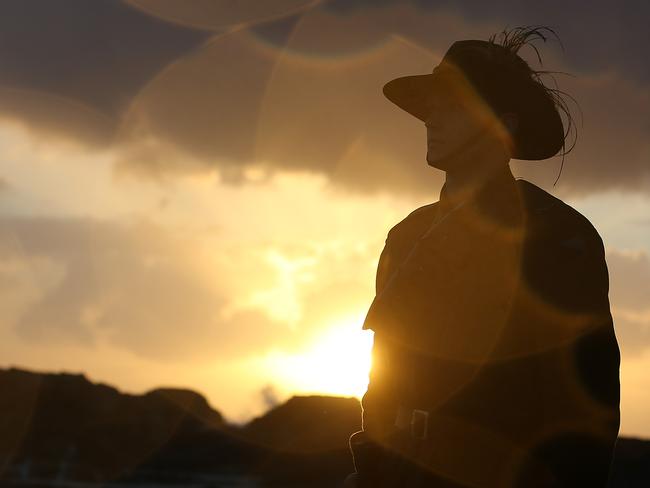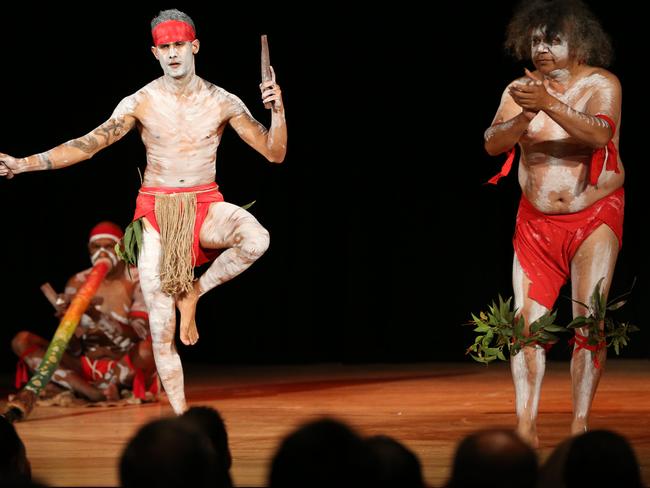Changing the date of Australia Day won’t change our past, says Joe Hildebrand
WHETHER you love or loathe Australia Day, there’s a fact you cannot dispute, writes Joe Hildebrand.
THERE is something about Australia Day that turns both socialists and skinheads into chumpsticks, which is perhaps in itself an argument for saving the date.
But what does it actually mean?
For most people it is little more than an excuse to have a beer or watch the tennis — and while there might not be much joy in the latter this year there is always a good reason for the former. Certainly no one I know sits around with a VB in one hand and a chop in the other shouting: “Yay! Cultural genocide!”
For those who mark Australia Day in any official capacity, indigenous Australians are emphatically represented, their culture celebrated and their dispossession acknowledged.
For more recent arrivals than Arthur Phillip and his cargo of convicts it is the day when they are formally welcomed into this nation, often after fleeing genocide themselves, in citizenship ceremonies around the country.
And for everyone else there’s always a barbecue or a Wiggles concert on somewhere.
But it cannot be denied that January 26, 1788 was not a good day for Aboriginal people — nor convicts for that matter — and this is something our history must recognise. Our constitution should recognise it too.

Yet January 26, 1788 was a very different day to January 26, 2017. As the nation’s top indigenous adviser Warren Mundine told me yesterday, few people are even thinking about Arthur Phillip sailing into Port Jackson on Australia Day.
They just want to relax and celebrate being lucky enough to live here.
This highlights Australia Day as something of an anachronism. What it means now has little to do with what it was then. And after almost two-and-a-half centuries we’d be a pretty stupid country if it did.
In one sense, even the fact January 26 has become our national day speaks to our good fortune. There has been no revolution to mark, no bitter civil war whose end needed celebrating. From the European perspective, our genesis has been so mild there simply aren’t that many dates of significance to choose from.
Kim Beazley, the best prime minister we never had, once suggested that in fact Anzac Day represented our true birth as a nation: The bonds of brotherhood forged by war, a new sense of courage and mateship and togetherness that emerged from unimaginable suffering and loss.
True enough. But Anzac Day is a day for reflection, not fireworks.

And of course the day of our technical founding as a nation is January 1, 1901. But that’s already New Year’s Day and what red-blooded Australian would ever tolerate losing a public holiday?
And so January 26, once a parochial day on the New South Wales calendar that competed with the foundation days of other colonies, was plucked from the hat of history. It wasn’t until the 1930s that it was even called Australia Day.
The prevailing wisdom seemed to be that it was as good a day as any, even if indigenous Australians begged to differ.
But the national days of many great democracies also have little to do with fairness or commonsense.
The most famous national day is of course America’s Independence Day, upon which in 1776 the brave colonists threw off the yoke of British oppression and dedicated themselves to “life, liberty and the pursuit of happiness”.
However there wasn’t much life for the native Americans they killed, nor liberty for the black slaves they kept — indeed, if they had remained a British colony the slaves would have been freed three decades sooner.
In France, it is Bastille Day, which celebrates the storming of that famous Paris prison in 1789 — the year after Australia’s European settlement.

And what a striking blow for freedom it was. There were no political prisoners in the building. Instead the revolutionaries liberated four forgers, two mental patients and an aristocratic pervert. Nonetheless it is celebrated with fireworks to this day.
And dear old Mother England, whose troops and social detritus sailed into Sydney Harbour, doesn’t even have a national day. It’s been invaded so many times that the notion of “Invasion Day” would be utterly absurd.
“Er, which particular invasion are you referring to?” some Cornishman would politely ask.
The truth is every country has a dark past. It is how its citizens respond to it that matters.
For the only absolute and undeniable fact about history is that it cannot be changed. Obsessing over historical grievances is what tore apart the Balkans in the 1990s and the Middle East in, well, forever. It’s also why so many people from these places are so grateful to have found a new start here.
We cannot reverse the mistakes of the past, nor fully remedy them. There is a limit to justice when both the victims and the perpetrators are long dead. All any mortal can do is accept the present and try to improve the future.
So maybe we should change the date of Australia Day or maybe we shouldn’t. Either way it will make no difference to the lives of Aboriginal people unless we couple it with more than hashtags and hand-wringing.
“The real change is only going to happen is when we start getting all our kids educated and when we start getting jobs and businesses in all our communities,” says Mr Mundine. “The real injustice is we spend so much money and so little has changed.”
Or, as said by the “proud part-Aboriginal” Anthony Dillon from the ACU’s Institute for Positive Psychology and Education: “For those who feel it is their mission to insist that non-Aboriginal Australians should somehow feel guilty for past sins, your energy would be better spent celebrating how far we’ve come and perhaps addressing the serious problems affecting Aboriginal people today”.
Indeed, any enlightened types racked with guilt over 1788 can assuage their consciences by donating to the Australian Indigenous Mentoring Experience or the Australian Indigenous Education Foundation or the Fred Hollows Foundation or the Recognise movement or countless other projects that change more than calendars.
Because if we actually fix the problems that are the real chasm between indigenous and non-indigenous Australians we’ll never need to worry about dates again.
Every day will be Australia Day.
Comments are now closed on this article




